A native of Guelph, Ontario, Chris Reid has over 26 years of experience in the cycling industry. Chris raced bicycles internationally and then was the a director of an Ottawa based women’s cycling team for several years. In his current role, as the Director of the NCIM at the Mattamy Velodrome in Milton, Ontario, he has had an incredibly positive impact on youth development in Ontario and on the international level. Chris provides a unique perspective on cycling development and shares his vision for the future.
Chris, you have been cycling and / or working in the industry for 26 years and can you tell us a bit about your upbringing and how you got hooked on the sport?
Initially I was a downhill ski racer and started mountain biking in the summer since it was a bit of the rage at the time. My big brother’s best friend also road raced and that gave me some exposure to the sport. But I started out racing mountain bikes at probably the sport’s zenith in the late nineties (apologies if anyone has a different timeline for this) and then bridged into road racing and then track. The last nail in the MTB coffin for me was when as a first year junior my folks told me they would help get me to EITHER mountain bike or road nationals, so I picked road solely because it had three events I could compete in versus only one mountain bike event. I went to the Canadian Road National Championships in Abbotsford BC and rode well enough to get an invite to Tour de L’Abitibi, an international junior stage race in Quebec. That created some great opportunities for me in the sport.
Your wife, Jenny Trew (current Canadian National Team Track Endurance Coach) is a cyclist as well. Did you meet through cycling? Did you still get out on rides together?
We actually met at the 2001 Canada Games. I was there racing for Ontario and she was racing for Alberta. We both went on to attend the University of Victoria. Vic at the time was really the epicentre of the scene in Canada – so many successful riders were based out of there, so going to school there just made sense.
The last few years we had not really gotten to ride much together, which was strange given how central it’s been to our relationship over the years (I’ve probably ridden with her more than any other single person). One of the silver lining’s of the pandemic was the opportunity to get out and ride together. She’s getting a fancy gravel bike this year and the riding up at my parents cottage is awesome, so fingers crossed there is much more this summer.
Chris racing with his wife, Jenny Trew, current Canadian Cycling Track Endurance Coach.
Before taking on your current roles, you and Jenny managed a successful women’s cycling team in Ottawa. Can you share with us a bit about that experience?
Yeah Vince Caceres who runs the Cyclery is an absolute gem in the Canadian cycling landscape, I just need to start with that on the top. He’s given us a decade of unwavering support and just let us run with it.
Jenny had been injured with a serious concussion in 2011 and was trying to come back and he gave her a spot on his women’s team. When it became apparent that a comeback was not in the cards Jenny took over running the team. She roped me in the next year to help and it just grew from there.
Initially the team had a really clear vision- we were trying to provide opportunities for Canadian women in an environment that would give them the tools to thrive on professional teams. We had both seen numerous examples of hugely talented women who had turned professional because they had phenomenal engines and then struggled to stay professional since they didn’t have the technical or tactical skills to do the work teams require.
It grew from there, and evolved over time to really be a Track-Road integration team. Some awesome alumni have come out of the program both as riders and people- the team has won 5 U23 or Elite National Road and Time Trial titles in the last 6 years and ten different riders have medalled at road Nationals. Three riders have gone to the Olympics and five riders have gone on to sign contracts with UCI teams.
I’d say right now we’re on the threshold of what the third evolution of the team is going to look like and it’s a pretty exciting time.
When you began working at the NCIM, the organization was just getting started. What was your mandate at that time?
The National Cycling Institute Milton (NCIM) is a not for profit corporation formed to advance cycling in Milton and across Canada. Our aim has always been to offer a full range of indoor track cycling opportunities to service cyclists of all abilities within the community and beyond.
On a personal level I’m lucky that my job at the NCIM has a crystal clear clarity of purpose: I want to make people love bike racing like I’ve loved bike racing. If I can do that then all the rest flows from that – the sport grows and some of those kids will achieve some truly excellent things.
Chris coaching at the National Championships.
Has your mandate shifted coming out of COVID? If so, what is it today? How do you see things developing over the next five years?
I think that the overall mandate stays the same but the tactics and operations around how we try and achieve that continue to evolve and grow. Coming out of Covid, we are trying to increase our outreach and grow a more diverse base for the sport. At the same time, we are trying to create the best possible training environment for our most dedicated young athletes who have dreams of representing Canada at the World Championships, Olympic Games and on Pro Tour cycling teams. I intentionally say “dedicated” not “talented” since I think the most important part of the pursuit of success in cycling is the pursuit, not the success itself. It’s in the pursuit that you learn the lessons you’ll take with you through life off the bike. We are always looking for funding partners passionate about advancing high-performance cycling in Canada and growing the base of youth cycling locally and across the country. To help the NCIM create more cycling opportunities for youth, you can donate directly to our efforts at this link: NCIM Donations. The NCIM also offers various branding and marketing opportunities for appropriate sponsors. (For more information, please contact admin@ncirevolution.com )
You’ve done a great job of synthesizing your experience as an athlete, managing a women’s team and are now a really positive force in youth development in Milton and beyond. This year, two athletes who were direct prodigies of the velodrome programing, Dylan Bibic and Carson Mattern won gold medals at the Junior World Championships. There are not only champions coming out of the track programming but also seems that a strong community is developing in the environment you’re creating out there.
2021 Junior World Champions, Carson Mattern and Dylan Bibic are direct prodigies of the Milton Velodrome.
When I look back on my experience in the sport, I saw a lot of talented youth come and go, but the ones who stuck with it were the ones that were intrinsically motivated and for the most part, had a good support structure around them. We all know intrinsic motivation is closely linked to athletic success, but tell us how you have designed the athlete programming at the NCIM to ensure that the athletes stay motivated and don’t burn out?
Absolutely! The kids that succeed in the long run are the ones that take ownership of their own journey in the sport. The talent has always been there in Canada- and historically we’ve seen that with some phenomenal athletes and performances. What we need to do is give that talent the tools and the opportunities to shine. But ultimately it’s a path that they need to walk on their own- that’s why loving the sport is central to it all. If the kids love riding and racing, then training becomes a given in their day, not something they’re forcing into the margins.
In terms of motivation and burn-out, I think one of the strengths of the velodrome is that with a big rental fleet (now run by Velofix) kids as young as 11 can come 1-2 times a week without owning their own track bike. It can fit in with other sports and doesn’t have to be all encompassing. Then if they choose to become more serious about it in a few years, they have a basis of skills and bike handling to build on.
I also think having track racing all winter gives some purpose to the riding as well as growing racing intelligence. We don’t have a ton of racing opportunities in Canada. The chance for kids to race 15 track races a year with 3 starts a race night is actually a huge pool of potential experience. Pair that with longer adventure rides in the summer when the weather is nice and I think we’re starting down a good path that fits the realities of our region and climate.
When I think back on all the coaches we worked with, the different training plans we completed and all the challenging races and living situations we faced, the one thing ingrained in me is that in a sport like cycling, there is no straight path to the top. I am not sure there is really any training program that can prepare you for the ups and downs of life of a professional cyclist. Ultimately, mindset and adaptability plays a big role in success. Is this something that you work on, particularly with the young athletes in the program?
Resiliency and an ability to problem solve are probably the two most underappreciated attributes of successful cyclists. And they are the ones that also help kids in life, and university. Simple things like time management are invaluable to success. I also think that we need to do a better job of messaging that cycling and school can and must go hand in hand in Canada. When I was at University of Victoria we saw a lot of rowers – there is a sport that trains a similar number of hours, and is historically intertwined with the Canadian and US college systems. A development athlete that doesn’t end up going to the Olympics still might end up with a degree from Yale. That’s a better long term value proposition for athletes and parents than putting off school to race as an amateur in Belgium (still go to Belgium, just don’t drop out of school).
I believe this fits your thoughts on there being no straight path: we have two types of kids coming out of the junior level in Canada- those that can handle training full time (rare) and those that can’t (the majority). For the kids that can’t, going to school gives them some balance until they build their training capacity to the point where they can actually handle riding full time. It also benefits those that can handle it as well though- even for our most talented athletes cycling is a long term game. And there is a whole set of other pressures for a 25 year old athlete who suddenly finds themselves on the threshold of actual success in the sport with no fall back or education plan.
Having a more holistic approach to the sport will allow more kids to follow their path further to the top- regardless of how divergent or winding they might be.
One of the biggest reasons I wanted Tara Whitten (2012 Olympic Bronze medallist, multiple World Cup Track medallist) on the Cyclery in 2015 and 2016 was she was finishing a PhD in neuroscience while being truly world class- I wanted someone that would model that integration at a level that was irrefutable. This past season Annie Foreman-Mackey ended up doing her first year of med school while also being the strongest rider in Canada’s Olympic pursuit lineup. I like to think some of why she knew this was doable was having seen Tara do it four years earlier.
What have been the biggest challenges you have faced since taking the lead at the NCIM?
Probably convincing the stakeholders that we are here to help and grow programs not to be rivals to them. The landscape in Ontario can at times be pretty fractured. I like to think that four years on, people see the successes coming out of Milton and realize that what we’re building is a shared success. A lot of things need to come together for Canada to produce world class riders – and the truth is there is no success that’s not shared success and no failure that isn’t shared failure in this game.
Cycling is an expensive sport and is a barrier to youth development and diversity. Those barriers seem to get progressively worse each year. How can we overcome this?
I mentioned before how important I think the rental bike fleet is- it allows kids to add a cycling discipline without having to shell out for another bike.
I also think the cycling industry eats its own- we all get excited by new toys and gadgets. But that puts a lot of pressure on kids and families to have the latest and greatest. And it’s easy to lose sight of the simple fact that no matter how fancy the bikes, they still don’t ride themselves. Do you need $50 aero socks? Do aero wheels matter more than knowing how to ride a cross wind?
I’m going to quote Public Enemy’s Chuck D here: “There’s still a thousand and one ways to lose with the shoes.”
Each generation faces their own unique challenges in sport as cultures shift. Are there any other big hurdles that you feel like youth cyclists are facing today? If so, how can we help them overcome them?
I think the amount of information and data at young riders’ finger tips can be a disservice. Too many kids know what watts per kilo everyone is but they don’t have a context for it. They forget or are never taught that at its essence bike racing is a game. Being fit buys you a hand at the table, but how you play your cards is the important part.
It’s important to message that the kids are learning a craft, and it takes a long time. And physical development also comes with time. With being consistent and doing the work day in and day out. Not just with single magic interval sets with bonkers TSS values.
I’ve seen you queue up at a few start lines this year. Do you have a favorite cycling discipline?
One of the things I love most about racing bikes is it’s a constant chance to reinvent yourself. I did my first Ontario Cup mountain bike race in 20 years this summer – and it was a hoot (also I am still quite shoddy at racing mountain bikes it turns out).
I’ve probably done close to a 1000 bike races at this point in my life, and I still learn something new every time I do one.
I’m increasingly drawn to events that are experiential – so I fully see the appeal of big gravel events and want to do more of them. I always liked long road races and these give me some of that without me having to be as fit!
I also love the art of trying to go fast in the pursuit. It is such a controlled experiment. I still have some unfinished business with master’s age group pursuitng- though like so many projects it remains to see if it ever gets finished!
What’s your greatest ride memory?
Hmmm…. This one quickly drifts into “War Stories” territory, but in 2007 I was invited by a bunch of ex-Marco Polo riders to put together a Canadian team for the Tour of the Himalayas in northern Pakistan. The whole trip was just a bonkers life experience, but the Queen stage was a 5.5hr monster over the Babusar Pass (at an elevation of 4,173 meters / 13, 691 feet- 4,000 feet higher than Brian Head Utah). Pretty much everyone came down with a stomach bug from a banquet the night before so there was a lot of flat coke for breakfast and not much else.
Chris racing the Tour of the Himilayas in Northern Pakistan
The Khagan Valley is otherworldly beautiful. The race was on mountain bikes (it was a gravel race before gravel was cool) and some of the places we rode through that day were unbelievably beautiful. Apparently the top of the Babusar Pass is one of the most breathtaking views on the planet. But I went over the top in the groupetto in the middle of a belting hailstorm so I’ll have to take other peoples word for it.
The mixture of it being the most untouched place I’ve ever ridden a bike and just so so hard make this one stand out.
Do you have a favourite route?
I love long rides though I rarely get the chance to do them anymore. Also I’m gonna continue my theme of not giving one answer for these questions. One ride that sticks out is the ride to Jordan River on Vancouver Island. It was a 150km round trip and there used to be a surf shack that sold cookies at the halfway mark. Not sure I ever did that ride in the dry though.
In Ottawa, my friend Rodd Heino used to have a “Cottage Loop” that was 160km of mainly gravel on the Quebec side of the river and featured a swim at a waterfall. It was a fantastic ride and I would love to do it now with wider tires and a cassette bigger than a 25…
Lastly, last year I rode from Milton to the family cottage up around Midland. It’s 217km and I did it in a heatwave in the middle of peak pandemic so I was trying to be self-reliant for water and snacks. It totally buckled me by the end- for the last 30km I was forever an hour away because my average speed kept dropping to match the distance I had left to go (27 km/hr at 27km…. 21km/h at 21 to go……).
I want a rematch with that ride.
If you were to create a playlist of your favourite bands/songs over the years to listen to while riding the trainer on a cold winter day, what would it look like?
Years ago when the Cyclery had both a women and men’s team we used to run indoor trainer sessions and I was accused of being a closet Ke$ha fan. I will neither confirm nor deny this.
I will say that Rancid’s “Out come the Wolves” and Operation Ivy’s self titled album are probably the albums I’ve listened to the most on the trainer in my life. And historically Iggy Pop’s “Search and Destroy” is the last song I listen to before a pursuit.
Thank you Chris. We look forward to following the progress of the kids in the program.
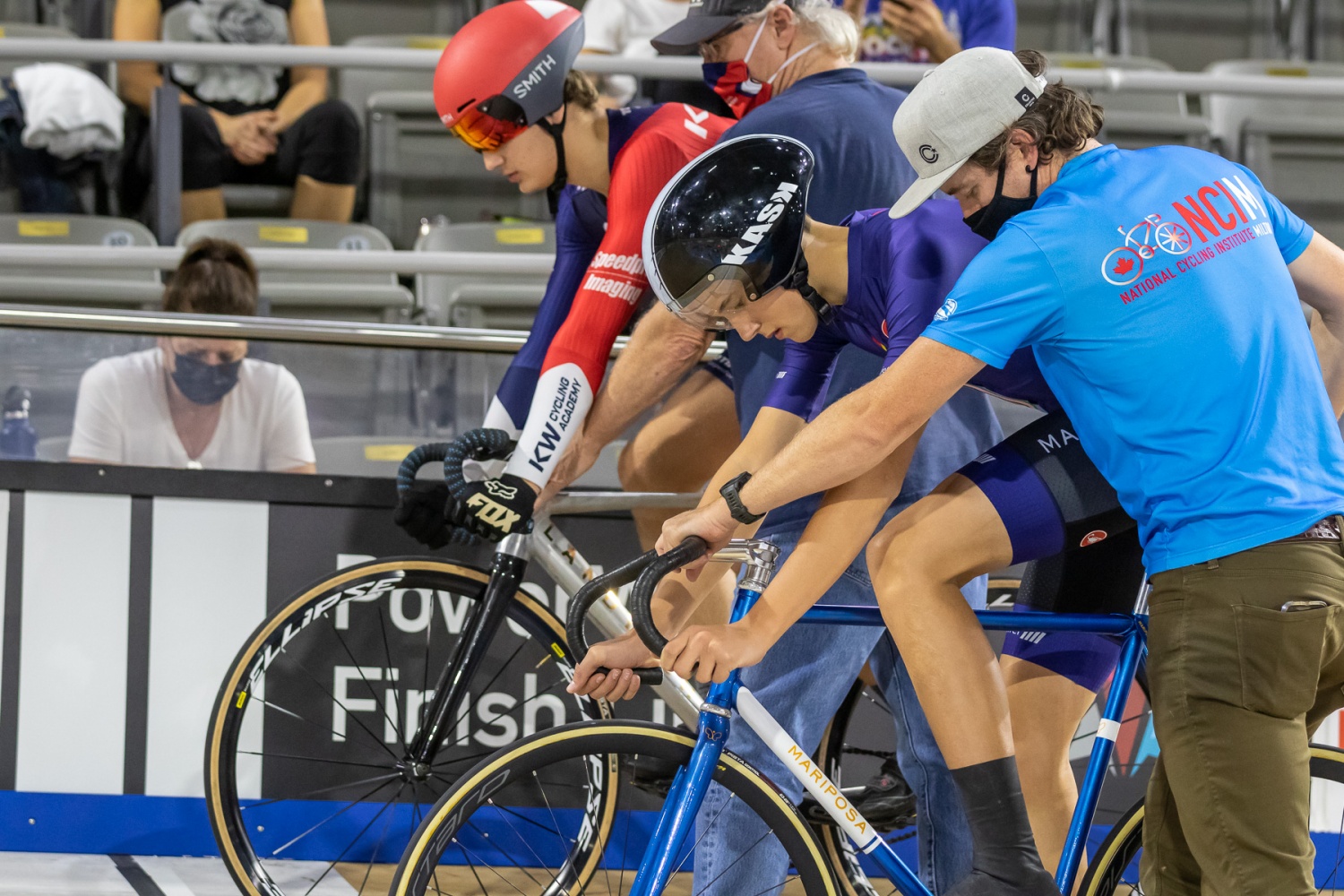
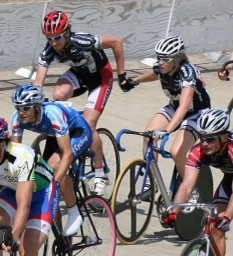

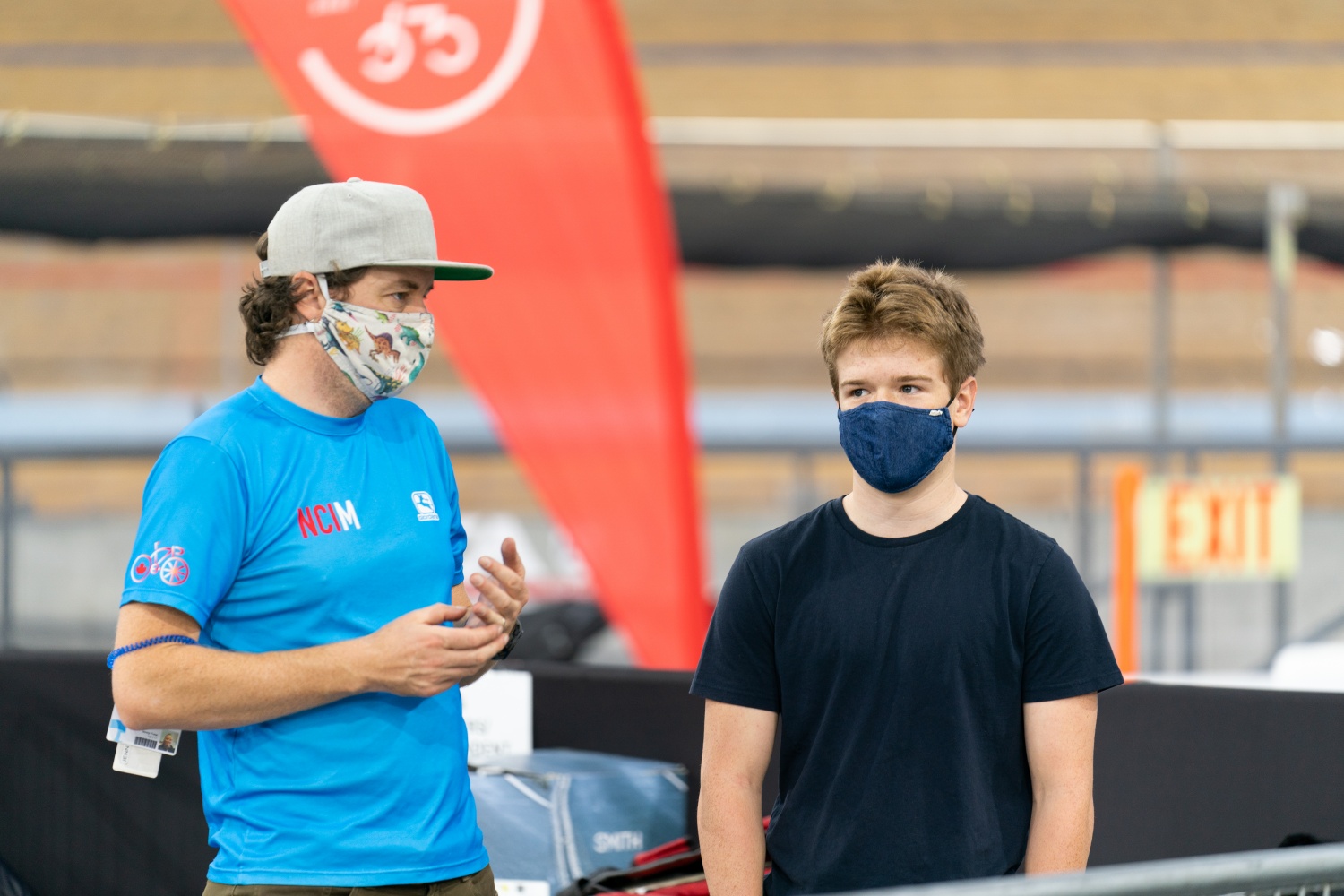
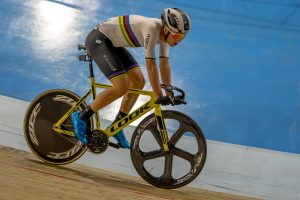
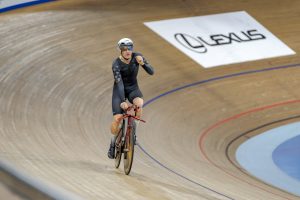
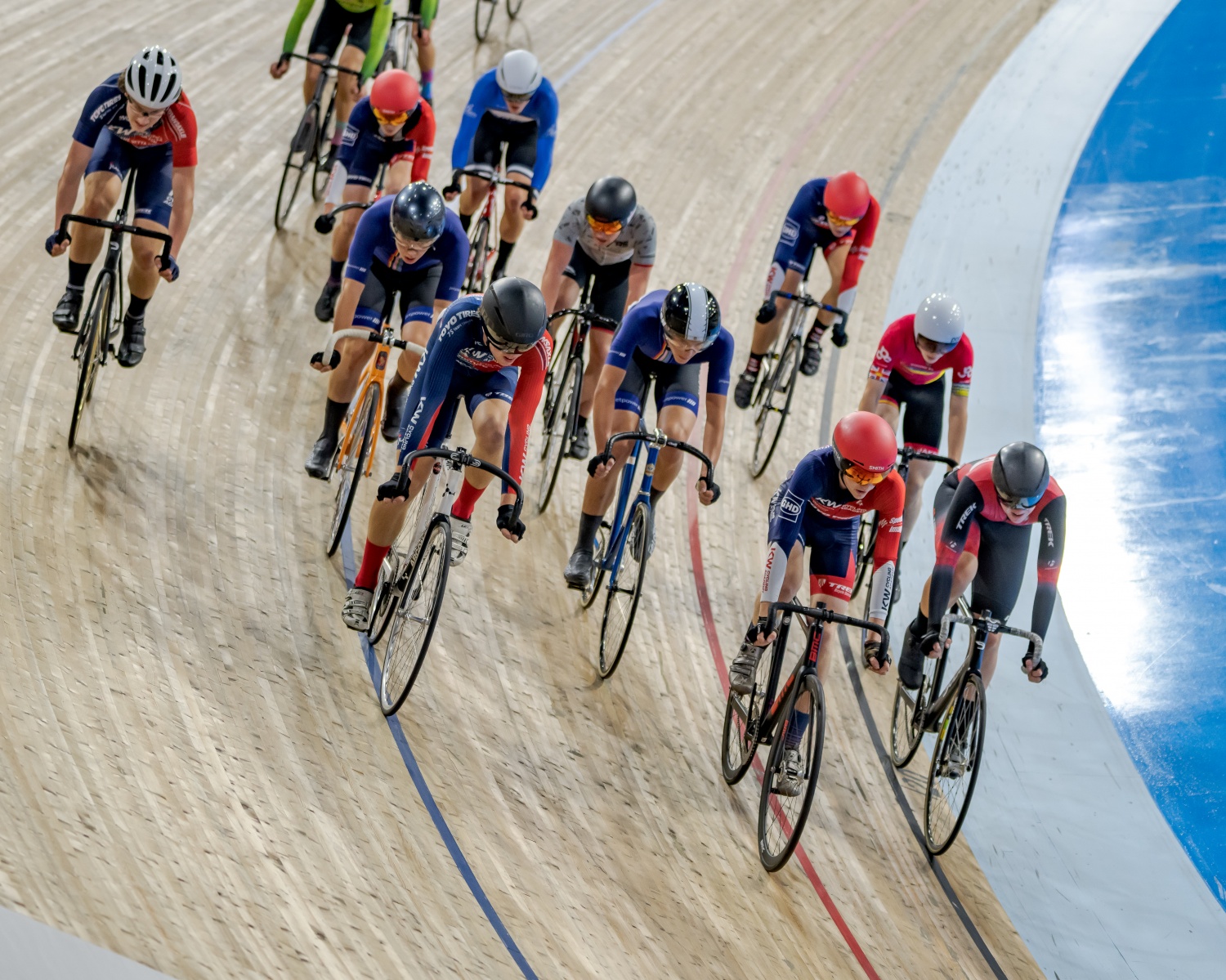
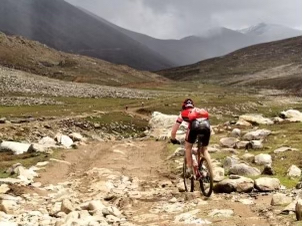
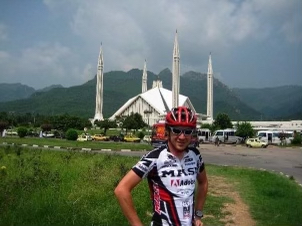
Hey Didi, what a great article. You asked just the right questions to enable Chris to give an excellent overview of his background ansd work. Some professional interviewers could learn a thing or two from you.
Thankyou, Peter
Thank you Peter. We are fortunate to have some really great people, like Chris advancing cycling in the community and it’s exciting to see the developments at the velodrome.